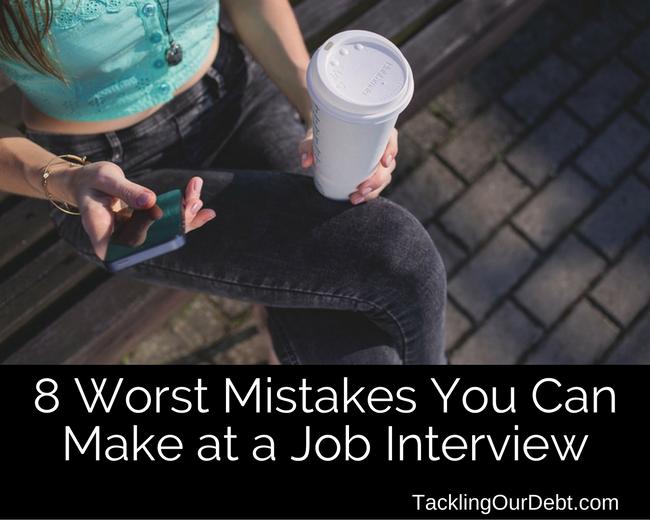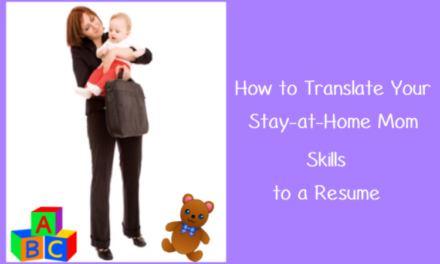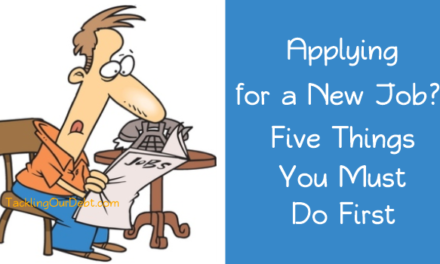I remember one of my teachers in high school telling us that we should say yes to every job interview whether we wanted the specific job or not. He said that attending numerous interviews would help us improve our interview skills. It would show us that everyone conducts interviews differently, and the more experience we gained, the better prepared we would be. And it is like anything else that we want to excel in, the more practice and experience we have, the easier it gets.
Even with a lot of experience, job interviews can still feel quite stressful, especially if you really want that job. You have to impress the interviewer, showcase your strengths and downplay your weaknesses, then to top it all — you have to be charming as well.
It’s definitely a tall order, and the last thing you want to do is to make these common interview mistakes.
Here are 8 of the worst mistakes you can make during a job interview. In fact, think back to your previous ones. Did you make any of these job interview faux pas? Read on and avoid these errors like the plague.
One: Arriving Late.
This is the first and most important point that could actually turn the interviewer off: lack of punctuality. You’re applying for a job, and the inability to come in on time and honor an appointment reflects very poorly on you.
Companies don’t just look for talented employees. They want employees who are reliable.
A talented by unreliable flake won’t be very productive and is unlikely to be an excellent team player. If you can’t come in on time for the interview, how can they trust you to show up on time everyday?
Two: Forgetting To Turn Your Cellphone Off.
A phone that keeps ringing definitely is a distraction. It’s also very disrespectful towards the interviewer.
During the job interview, you want to make sure that you make the most of the interviewer’s time. If you keep wasting minutes dealing with a phone that just won’t stop, then you’re not really giving the interview your full attention.
If you’re uneasy with turning your phone completely off, at least put it on silent. Don’t turn the “vibrate” function on. It’s still distracting.
An interview takes thirty minutes at most; what’s wrong with keeping it silent for that span of time?
Three: Not Knowing Anything About The Company.

It’s important to do your research beforehand.
You have to come in with some knowledge of the company. It’s not that difficult these days, especially since you can find so much information on the Internet.
That’s why it’s doubly shameful to attend the interview without taking the time to research some history about the company.
For one, it looks like you’re lazy and can’t be bothered to do any kind of preparation. It reflects poorly on your work ethic, and might even give off the signal that you’re not really interested in the job.
Four: Lying To The Interviewer.
It’s not just lying about your qualifications. You have to be careful not to make claims you can’t back up. Some applicants might think it’s acceptable to tell white lies or small fibs about their previous jobs, educational background, or even colleague interaction.
The problem is that most things can be investigated quite easily. For example, if you exaggerate to give off the idea that you played a bigger role in your previous company than you actually did, a quick call to your manager or co-workers can easily show that you were lying.
Five: Relying On Cliches.
It’s very easy to use canned responses. When asked to cite your weaknesses, don’t say something like, “I’m a perfectionist” or “I’m a workaholic”. These are not real weaknesses, and you know it. In fact, the interviewer knows it.
These canned answers make you look bad. It means you are being glib, and that your answers aren’t trustworthy. Certainly, a question about your weaknesses isn’t easy to answer, but HR practitioners will definitely appreciate an honest and thoughtful answer.
Six: Not Listening.
Some people think it’s important to fill every minute of the interview with information about themselves.
Remember that an interview is a conversation — though definitely not a casual one. It means you have to have a give and take.
Let the interviewer talk. If you talk too much and never let the interviewer get a word in edgewise, you’re sending very bad signals. It means your communication skills need improvement, and that you’re likely to be a bad team member.
Seven: Dressing Inappropriately.
It’s a fact of life that people will judge you by the way you look. This is doubly true in a job interview. If you come in wearing shorts and flip-flops, the interviewer will see someone who takes the interview too lightly. Of course, the same look can be acceptable if you’re interviewing for the position of a lifeguard. For an office job? Probably not.
It’s a good idea to look up the dress code of the company so that you have some guidelines to follow. At the very least, remember that you need to look smart, clean, and prepared. Don’t wear anything provocative, indecent, or too loud.
Eight: Bad-Mouthing Your Former Boss.
Though it might be true that you had the worst possible experience at your previous job, complaining about it reflects poorly on you. When you bad-mouth a former employer, the interviewer will find it awkward. You could just as easily be bad-mouthing their company if they hire you. No one wants someone who complains constantly, especially in a work environment.
Even though the economy is beginning to turn around there are still hundreds of people applying for every job opening out there. So when you are invited to your next interview understand that you have a lot of competition, which makes is even more important for you to make a good impression.





